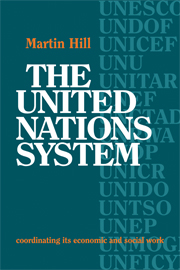Book contents
- Frontmatter
- Contents
- Foreword
- Preface
- Introduction
- Part I The problem of coordination and its setting
- Part II Some conclusions and suggestions
- 8 The context and the perspective
- 9 The role of the Economic and Social Council
- 10 Other aspects of UN–agency relationships
- 11 The functioning of the Administrative Committee on Coordination
- 12 Some structural and organizational issues
- 13 Expansion, adaptation, concentration and the responsibilities of the General Assembly
- Postscript
- 1 Abbreviations and glossary of institutions
- 2 Principal organs of the United Nations (General Assembly, Economic and Social Council and Secretariat) with main subsidiary organs directly concerned with economic and social cooperation and coordination (Status as of Spring 1976)
- 3 Chart of agencies related to the United Nations
- 4 Regional and branch offices of organizations of the United Nations System
- 5 Chart of the United Nations System
- 6 A new UN structure for global economic cooperation–list of conclusions and recommendations of the Group of Experts, prepared by the Secretariat
- Notes
- Index
11 - The functioning of the Administrative Committee on Coordination
Published online by Cambridge University Press: 05 November 2011
- Frontmatter
- Contents
- Foreword
- Preface
- Introduction
- Part I The problem of coordination and its setting
- Part II Some conclusions and suggestions
- 8 The context and the perspective
- 9 The role of the Economic and Social Council
- 10 Other aspects of UN–agency relationships
- 11 The functioning of the Administrative Committee on Coordination
- 12 Some structural and organizational issues
- 13 Expansion, adaptation, concentration and the responsibilities of the General Assembly
- Postscript
- 1 Abbreviations and glossary of institutions
- 2 Principal organs of the United Nations (General Assembly, Economic and Social Council and Secretariat) with main subsidiary organs directly concerned with economic and social cooperation and coordination (Status as of Spring 1976)
- 3 Chart of agencies related to the United Nations
- 4 Regional and branch offices of organizations of the United Nations System
- 5 Chart of the United Nations System
- 6 A new UN structure for global economic cooperation–list of conclusions and recommendations of the Group of Experts, prepared by the Secretariat
- Notes
- Index
Summary
Chapter 5 has attempted to describe ACC's central role in inter-organizational coordination; it has hinted at some of ACC's unfulfilled potentialities and suggested that the Council might call on ACC directly or through the Secretary-General more than in the past for advice on the best means of modifying the resources of the system; it has also made clear some of ACC's inherent limitations. There is reason to think that the need for ACC and its importance will continue to increase; indeed the actions of the two special sessions of the General Assembly imply an extensive further enlargement of its responsibilities. Resolution 3362 of the General Assembly's Seventh Special Session sets in motion a series of measures ‘as the basis and framework for the work of competent bodies and organizations of the UN system’; and to the considerable degree to which these measures (which include not just studies and reports, but international conferences and meetings of experts, intergovernmental negotiations and in some cases institutional changes) involve joint or collective action by several organizations, a clear responsibility falls upon ACC. How is it to be strengthened and restructured to meet its enhanced responsibilities in the new context that has been moulded by the General Assembly, which aspects of its structure and functioning should be preserved and which modified? The ACC has been wrest-ling with these questions and much of what follows reflects ideas and decisions that have emerged from this exercise.
- Type
- Chapter
- Information
- The United Nations SystemCoordinating its Economic and Social Work, pp. 126 - 132Publisher: Cambridge University PressPrint publication year: 1978



